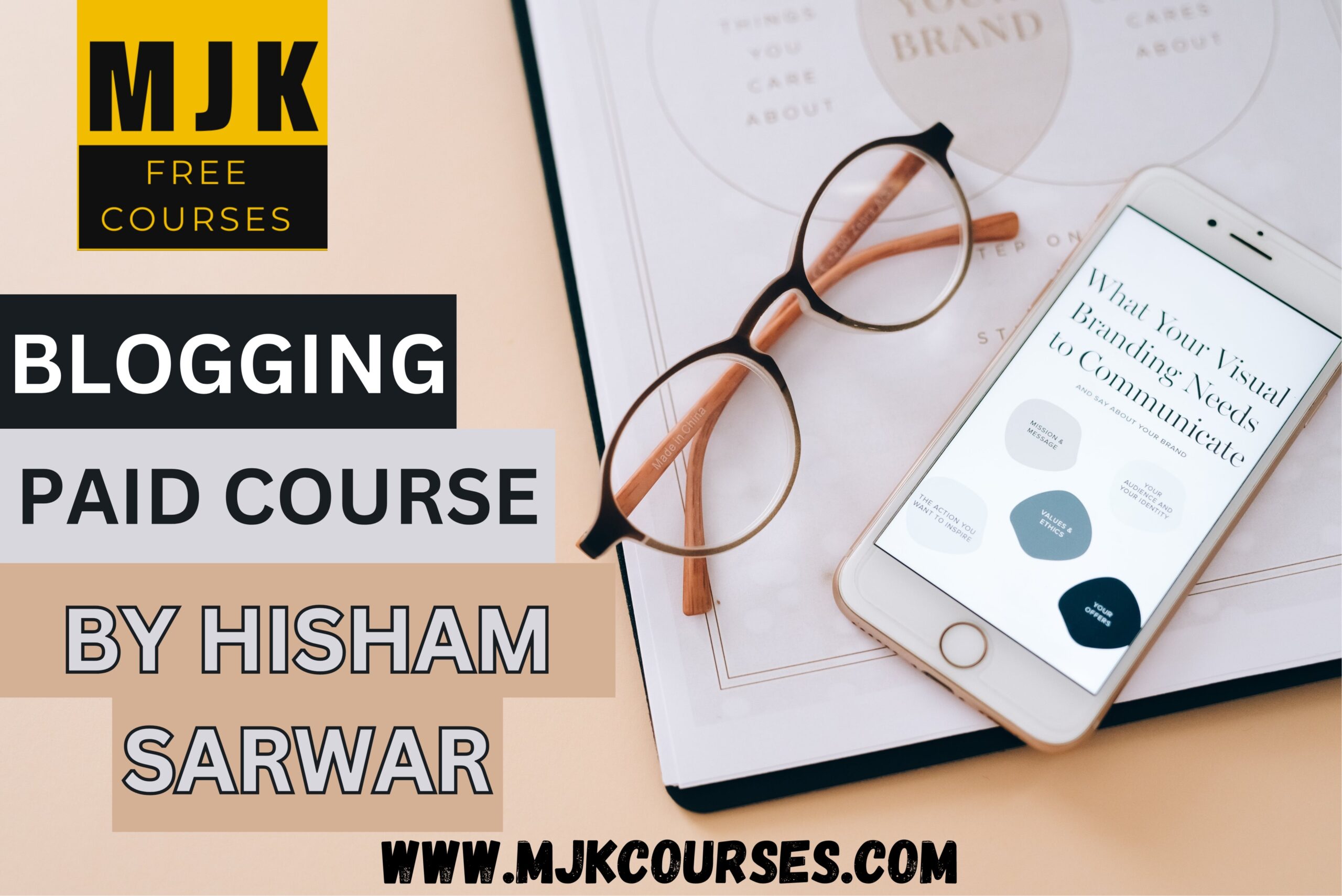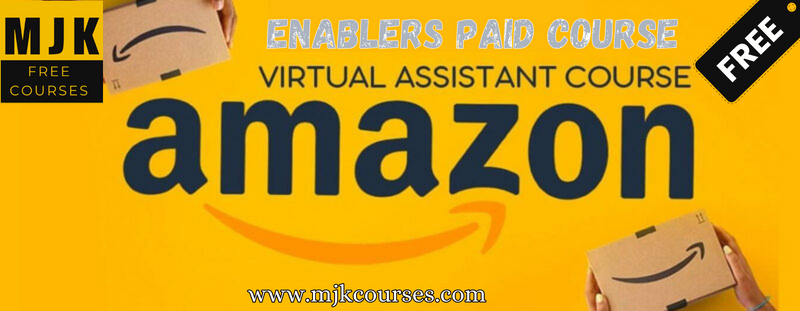
Blogging Paid Course By Hisham Server For Free
Table of Contents
ToggleBlogging Course: A Comprehensive Guide to Start and Grow Your Blog
Introduction
- Importance of blogging
- Why take a blogging course
- What to expect from this guide
Chapter 1: Blogging Basics
- What is a blog?
- Understanding different types of blogs
- Finding your blogging niche
- Choosing a blogging platform
- Setting up your blog
Chapter 2: Creating Great Content
- Identifying your audience
- Writing compelling headlines
- Crafting engaging introductions
- Using images and videos effectively
- Developing your writing style
Chapter 3: Search Engine Optimization (SEO)
- Understanding SEO basics
- Conducting keyword research
- On-page optimization techniques
- Off-page optimization strategies
- Measuring and tracking your SEO performance
Chapter 4: Growing Your Blog
- Building your email list
- Promoting your blog on social media
- Using guest posting to reach new audiences
- Collaborating with other bloggers
- Paid advertising for blog growth
Chapter 5: Monetizing Your Blog
- Different ways to make money from blogging
- Creating digital products
- Affiliate marketing
- Advertising and sponsored content
- Building a membership site
Chapter 6: Maintaining and Scaling Your Blog
- Developing a content strategy
- Outsourcing content creation
- Managing your time effectively
- Scaling your blog for growth
- Avoiding burnout
Conclusion
- Recap of key takeaways
- Final thoughts on blogging
- Encouragement to start your blogging journey
FAQs
- How long does it take to launch a profitable blog?
- Can someone without technical knowledge start a blog?
- How do I generate concepts for blog posts?
- Do I need to invest money to start a blog?
- Can I make a living from blogging?
- How often should I add new articles to my blog?
- Does my blog need to be active on social media?
- How can I evaluate the effectiveness of my blog?
- What are some common errors that bloggers should avoid?
- How do I stay motivated to blog consistently?

Blogging Course: A Comprehensive Guide to Start and Grow Your Blog
Blogging has become one of the most popular ways to share ideas, express oneself, and earn a living. With millions of blogs on the internet, the competition to stand out and grow a successful blog has become increasingly challenging. That’s why taking a blogging course can be a great investment for anyone who wants to start or grow their blog.
This comprehensive guide will cover all aspects of blogging, from the basics of creating a blog to monetizing it and growing a loyal audience. Whether you’re a beginner or an experienced blogger, you’ll find valuable insights, tips, and techniques to take your blog to the next level.
Introduction
In this section, we’ll cover the importance of blogging, why taking a blogging course can be beneficial, and what you can expect from this guide.
Importance of Blogging
Blogging is a powerful tool for individuals and businesses to share their knowledge, experiences, and insights with a broader audience. By creating valuable content that resonates with your audience, you can establish yourself as an authority in your niche, build trust with your readers, and even earn a living.
Why Take a Blogging Course
While it’s possible to learn blogging through trial and error, taking a blogging course can help you avoid common mistakes, save time and effort, and learn from experienced bloggers. A comprehensive blogging course will cover everything from creating a blog to monetizing it and growing your audience.
What to Expect from this Guide
This guide is divided into six chapters, each covering a different aspect of blogging. We’ll start with the basics of creating a blog and move on to more advanced topics like search engine optimization (SEO), blog promotion, and monetization.
Chapter 1: Blogging Basics
In this chapter, we’ll cover the basics of blogging, including what a blog is, different types of blogs, how to find your niche, and how to set up your blog.
What is a Blog?
A blog is a website that features written content, often in the form of articles or blog posts, that are organized by date, category, or tags. Blogs can cover a wide range of topics, from personal stories to business advice, and everything in between.
Understanding Different Types of Blogs
There are various blog categories, including personal, business, news, and niche blogs. Each type of blog has its own unique characteristics and audience.
Finding Your Blogging Niche
To stand out in a crowded blogging market, it’s important to find your niche – a specific topic or area of interest that you’re passionate about and that resonates with your audience.
Choosing a Blogging Platform
There are several blogging platforms to choose from, including WordPress, Blogger, and Squarespace. Each platform has its own pros and cons, depending on your needs and goals.
Setting Up Your Blog
In this section, we’ll cover the technical aspects of setting up a blog, including choosing a domain name, hosting provider, and installing WordPress.
Chapter 2: Creating Great Content
Creating great content is the heart of a successful blog. In this chapter, we’ll cover how to create content that resonates with your audience, how to write compelling headlines and introductions, and how to use images and videos effectively.
Identifying Your Audience
To create content that resonates with your audience, you need to know who your audience is, what their pain points are, and what solutions they’re looking for.
Writing Compelling Headlines
A great headline can make the difference between a post that goes viral and one that gets buried in the archives. In this section, we’ll cover how to write headlines that grab your readers’ attention and encourage them to click through.
Crafting Engaging Introductions
You have the opportunity to pique readers’ interest and persuade them to keep reading in your introduction. We’ll cover different strategies for writing compelling introductions that keep your readers engaged.
Creating Quality Content
Creating quality content is essential for building a loyal readership. In this section, we’ll cover tips and techniques for creating content that is informative, engaging, and well-researched.
Using Visuals in Your Content
Long passages of text can be broken up with images and videos to increase interest in your content. We’ll cover best practices for using visuals in your content, including how to choose the right images and how to optimize them for the web.
Chapter 3: Search Engine Optimization (SEO)
Your blog will be optimized for search engines like Google through the process of search engine optimization (SEO). In this chapter, we’ll cover the basics of SEO and how to optimize your blog for better search engine rankings.
Understanding SEO Basics
SEO can be a complex topic, but understanding the basics is essential for getting your blog noticed by search engines. We’ll cover the key concepts of SEO, including keywords, backlinks, and on-page optimization.
Conducting Keyword Research
Finding the words and phrases that your target market is searching for is known as keyword research. We’ll cover how to conduct keyword research and how to use those keywords in your blog posts.
On-Page Optimization
On-page optimization involves optimizing the content and structure of your blog posts for better search engine rankings. We’ll cover best practices for on-page optimization, including how to use headings, meta descriptions, and internal links.
Building Backlinks
Backlinks are connections to your blog made by other websites. They are an important factor in SEO and can help to boost your search engine rankings. We’ll cover different strategies for building backlinks and how to avoid common pitfalls.

Chapter 4: Blog Promotion
Promoting your blog is essential for getting it noticed by a wider audience. In this chapter, we’ll cover different strategies for promoting your blog, including social media, email marketing, and guest blogging.
Social Media Promotion
Social media can be a powerful tool for promoting your blog and building a loyal audience. We’ll cover best practices for using social media to promote your blog, including how to choose the right platforms and how to create shareable content.
Email Marketing
Email marketing is one of the most effective ways to promote your blog and build a loyal audience. We’ll cover how to build an email list, how to create effective email campaigns, and how to measure your results.
Guest Blogging
Guest blogging involves writing a blog post for another website in your niche. It can be a great way to get your content in front of a wider audience and build backlinks to your blog. We’ll cover best practices for guest blogging, including how to find the right opportunities and how to write effective guest posts.
Chapter 5: Monetizing Your Blog
Monetizing your blog can help you earn a living from your passion. In this chapter, we’ll cover different ways to monetize your blog, including affiliate marketing, advertising, and sponsored posts.
Affiliate Marketing
Affiliate marketing involves promoting other people’s products and earning a commission on any sales that result from your promotion. We’ll cover how to get started with affiliate marketing and how to choose the right products to promote.
Advertising
By placing advertisements on your blog, you can make money based on clicks or impressions. We’ll cover different types of advertising, including display ads, native ads, and sponsored content.
Sponsored Posts
Sponsored posts involve creating content that promotes a brand or product in exchange for payment. We’ll cover how to find sponsored post opportunities and how to create sponsored content that resonates with your audience.
Chapter 6: Building a Community Around Your Blog
Building a community around your blog can help you create a loyal following and increase engagement. In this chapter, we’ll cover different strategies for building a community, including creating a forum, hosting events, and building a social media presence.
Creating a Forum
A forum can be a great way to build a community around your blog and give your readers a place to discuss your content. We’ll cover best practices for creating a forum and how to moderate it effectively.
Hosting Events
Hosting events can be a great way to build a community around your blog and give your readers an opportunity to connect in person. We’ll cover different types of events, including meetups, webinars, and conferences.
Building a Social Media Presence
Social media can be a powerful tool for building a community around your blog and engaging with your readers. We’ll cover best practices for building a social media presence, including how to choose the right platforms and how to create shareable content.
Conclusion
In this blogging course, we’ve covered the fundamentals of blogging, from choosing a niche and setting up your blog to promoting it and monetizing it. We hope you’ve found this course helpful in achieving your blogging goals.
FAQs
- What is a blog?
- What does it cost to launch a blog?
- How often should I post on my blog?
- How do I promote my blog?
- How do I make money from my blog?
- How can I evaluate the effectiveness of my blog?
- Can someone without technical knowledge start a blog?
- Do I need a sizable audience to make money from my blog?
Answers to the FAQs
What is a blog?
- A blog is a type of website where an individual or a group of individuals share their thoughts, ideas, opinions, or experiences on a particular topic or niche. It usually includes text, images, videos, and other multimedia content and is updated regularly with new posts.
What does it cost to launch a blog?
- The cost of starting a blog can vary depending on the platform and hosting provider you choose. Some platforms like WordPress and Blogger offer free plans, but if you want to have your own domain name and more control over your blog, you’ll need to purchase hosting, which can range from $2.75 to $20 per month.
How often should I post on my blog?
- The frequency of your blog posts depends on your niche, audience, and goals. However, it’s recommended to post at least once a week to keep your readers engaged and your blog updated.
How do I promote my blog?
- Promoting your blog involves various strategies like social media marketing, guest posting, email marketing, and SEO. You can start by sharing your blog posts on your social media channels and engaging with your followers, reaching out to other bloggers in your niche for guest posting opportunities, building an email list to promote your content, and optimizing your blog for search engines.
How do I make money from my blog?
- There are several ways to monetize your blog, including affiliate marketing, sponsored content, selling digital or physical products, and advertising. You can start by choosing a monetization strategy that aligns with your niche and audience and building a loyal following.
How can I evaluate the effectiveness of my blog?
- The success of your blog can be measured by various metrics like traffic, engagement, social media followers, email subscribers, and revenue. You can use tools like Google Analytics and social media analytics to track your progress and make data-driven decisions.
Can someone without technical knowledge start a blog?
- Yes, you can start a blog without any technical knowledge by using user-friendly platforms like WordPress, Blogger, or Wix. These platforms offer pre-designed templates, drag-and-drop editors, and built-in features that make it easy to create and manage your blog.
Do I need a sizable audience to make money from my blog?
- No, you don’t need to have a large following to monetize your blog. What matters more is the engagement and loyalty of your followers. Even if you have a small but engaged following, you can still make money from your blog through various monetization strategies.
ACCESS THE PAID COURSE FOR FREE
ALSO, TRY KASHIF MAJEED YT COURSE


